
Diana Rempe rides the Street Books library bike, traveling to another library site. Street Books is a mobile library that serves people experiencing homelessness. Books are free to check out, and no ID is required.
Kristyna Wentz-Graff / OPB
Near a street corner in Portland’s Old Town neighborhood, street librarian Diana Rempe has set up a cargo bike with a shelf display and a massive wooden box emblazoned with STREET BOOKS. It’s packed with everything from works by Aldous Huxley, to Joy Harjo, to Dean Koontz, with histories, classics, poetry, thrillers, comic books and more.
For more than a decade, librarians with the nonprofit mobile library Street Books have been biking around the city bringing books directly to people who live outdoors. There’s no proof of address or ID required to check out a book, no late fees, and no deadline to return a book; customers can loan their books to a friend first if they’d rather.
Street Books was founded in the summer of 2011 by writer and teacher Laura Moulton.
“My idea was just to run a three-month art project that invited people to participate who I reckoned had never been invited to participate in much,” Moulton said. “It was mostly an art project that had a service component, and I loved books, and I loved bicycles, and so it felt to me like an idea whose time had come.”
The library began as a one-person, one-bike enterprise that summer, with Moulton setting up shop at locations like the Skidmore Fountain near the Willamette River, and the Park Blocks near the Portland Art Museum. That first season, the offerings included books from Moulton’s personal collection — including Edward Abbey’s “The Monkey Wrench Gang,” the short story collection “Portland Noir,” and Louis L’Amour westerns she’d inherited from her grandfather — along with some others she’d picked up at used bookstores.
In the years since, Street Books has grown into a portable literary scene for avid readers on Portland’s streets like Ben Hodgson, who Moulton calls Hodge — one of the library’s first regulars.
“I was living outdoors when I first found Street Books, and I was checking out maybe three books a week. I probably got over 50 books that first season,” Hodgson said. “I’d sit down at the waterfront on that bench and pass the time of day. It really, really beats sitting around doing nothing, and it most definitely beats sitting around feeling bad.”
A lot has changed for Hodgson since then. For years now, he’s been housed. He’s one of several paid street librarians, positions that Street Books has sought to fill with people who’ve experienced homelessness, when it can.
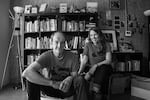
Street Books librarians Ben Hodgson and Laura Moulton are the co-authors of "Loaners: The Making of a Street Library." The book chronicles the creation of the library, Hodgson's life outdoors and their friendship.
Eli Haan / Courtesy of Street Books
He’s also an author. Hodgson cowrote the new book “Loaners: The Making of a Street Library” with Moulton about the library, his life outdoors and their friendship.
In the book, Moulton recalled their first meeting, at the bike library, out by Skidmore Fountain. Hodgson had red horn-rimmed glasses and a wild beard, and he checked out the satirical crime novel “Dog Eats Dog,” and John Steinbeck’s “Travels with Charley: In Search of America.”
“He was the first one to bust my chops for not having P.G. Wodehouse,” Moulton said in a recent conversation. “And then [he] quickly proved himself to be an incredible storyteller — far better read than I was or am.”
One of the many assumptions that people can make about people experiencing homelessness is that they don’t read, that they lack the interest, the ability, or the literary taste of their housed neighbors. Fact check: Many of them love to read. And as Hodgson pointed out, their tastes run the gamut, like the woman whose face lit up at the book by Brazilian writer Paulo Coelho they’d stocked upon her request, or “the guy that didn’t want that particular Nietzsche book because it was the wrong translation.”
A day at the library
At the bike library in Old Town, street librarian Diana Rempe welcomes patrons, checking in with them on book requests and offering some new reading glasses, sorted by size. Once a patron, relieved to get a pair, told her “Oh, I can read my prescription now,” she said.
It’s about more than books, Rempe said, “it’s also about functioning in your life.”
The library has set up near the office of Street Roots, the street newspaper and homeless advocacy organization, which helps the bike library feel like even more of a gathering place. Many of today’s patrons are Street Roots vendors stopping by the office to pick up papers. Customers are browsing the selection, and then shooting the breeze at nearby covered picnic tables. They’re cracking jokes, having a smoke, listening to music. Someone is trying out skateboard tricks on the sidewalk.
D.J. Husar is here to pick up a book he requested.
“I lost a copy of the first [book] in the C.S. Lewis ‘The Lion, the Witch and the Wardrobe’ series,” Husar said. “I only read half, and it got stolen out of my tent, and they were kind enough to get me the book so I could finish reading it.”
Husar’s mom got him reading young. He first read Dante’s “Inferno,” he said, when he was 10. Once, his dad brought a book about the hotel industry home from a business trip, maybe not the most exciting topic for a kid, but Husar read it nonetheless. As a kid, he’d spend hours at the library in New Jersey, where he grew up.
“Before online, there were books. And you’d go, and you could find out about anything you were interested in,” he said.
These days, Husar reads fantasy and science fiction for enjoyment. In college, he studied Hemingway, Vonnegut, romantic poetry, “Beowulf,” and more. Yeah, he says, he may be living outdoors, but he’s got a college education.
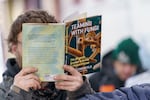
A patron reads a book they chose from the Street Books library in February.
Kristyna Wentz-Graff / OPB
“Homeless people are just people like anybody else,” Husar said. “I myself, I’m out here, but I happen to have a degree in literature, and I love to read. And where else could I go? I go to the library — we have a good central library — but having it come right to us is amazing.”
Racheal, who only gave her first name, is two books into “The Death-Defying Dr. Mirage” series.
“She can talk to ghosts, and she’s trying to bring her husband back from the dead, and it’s really complicated, and they left on a cliffhanger,” she said.
The librarians are on the hunt for the next installment for her to check out, but in the meantime, she’s scooped up some fresh Stephen King, Nicholas Sparks and Dean Koontz. Racheal says she reads a little bit of everything — and she reads fast.
“If I’m really just sitting down and reading — because, I live in a shelter — if I’m really just sitting down and reading, I can read probably a book a day,” she said.
So she loves the steady flow of books from Street Books. But she also appreciates the human connection with the librarians, including Rempe.
“She remembers you. She remembers your name, she remembers what you’ve asked for,” Racheal said. “I just love her friendly attitude and the fact that she’s providing books to us.”
Billy Joe Baker is a regular from another of the library’s weekly stops in St. Johns who visited the downtown spot the day OPB was there. Rempe says he loves making book recommendations: for instance, she brought along a book about the Portland Black Panthers, because Baker used to know some members when they were younger, before the local chapter was formed.
“They were younger than me, but I knew their families, and I would have probably been a part of that, if I wouldn’t have moved,” Baker said. “They were using their minds, you know, instead of their dukes.”
That book is one he enjoys recommending to others. A big part of the reading experience for him is the conversation that comes afterwards.
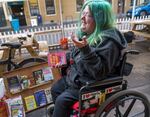
Jennifer Bradford laughs at her choice of books while visiting the Street Books library. Street Books is a small lending library built on a bike, that serves people experiencing homelessness.
Kristyna Wentz-Graff / OPB
“It seems like it related to me, the books that [Street Books] gave me, that I was reading. I could relate it to my life. What it helped me to do is to go and share with others. And after sharing with them, we sit down and discuss what we read and what we got out of the book. And so, for me, that was really enlightening, because the other person had a chance to share what they believed,” Baker says. “There’s no right or wrong.”
At times, that enlightenment has been rather profound in his own life.
“The main thing I’ve learned from my readings is: Life is not a problem to be solved, but a reality to be experienced,” he said. “And so, in that sense, it has helped to motivate me so that I don’t fear life at all.”
Jennifer Bradford showed up at the downtown library shift too, showing off her new multicolored hairdo. She came looking for age-appropriate comics for her 13-year-old son.
“[He likes to read] all different kinds. He also likes rocks and science and cars. But he’s a teenager now,” she said.
Bradford said she doesn’t really read herself, after her stroke, but she loves coloring to soothe her mind. She’s picked up a coloring book and some markers today, and tells the street librarian that she’ll make copies to pass around.
“I used to print out coloring pages for the clients when I was working at a shelter. It helps to de-stress,” Bradford said. “And being homeless, there’s a lot of stress.”
Rempe, the librarian, thanks her for the offer: “You’re so generous that way.”
“I try to make sure that people get help with things,” Bradford answered.
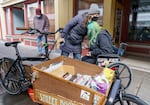
Diana Rempe, left, hugs Jennifer Bradford, right, during a Street Books shift. Bradford was looking specifically for coloring books.
Kristyna Wentz-Graff / OPB
More than a library
Rempe says the sense of camaraderie she’s seen on the streets, people helping each other out, has been even more stunning during the pandemic. It’s a time when people living outside have often felt abandoned, she said, shut out from the kindness of a warm kitchen or an indoor restroom.
“There’s a degree of suffering out on the street that I’ve never seen before, and I’ve been doing this since 2012,” she said. “And yet! Acts of kindness and gratitude and generosity. It just happens all the time. All the time.”
Street Books has stepped up too, adapting to its patrons’ lives amid the virus.
Earlier in the pandemic, the library shifted to more one-on-one outreach in an attempt to avoid the type of in-person gathering created by a typical bike library shift, though those have resumed. Founding street librarian Laura Moulton has also delivered boxes of books to some of Portland’s organized villages for unhoused residents.
Meanwhile, the library has expanded beyond books to bring needed supplies to people on the frontlines of a housing crisis, a public health crisis and a climate crisis. Rempe and fellow librarian Sofie Jokela delivered hundreds of donated N-95 masks — helpful for dealing with both fire smoke and police tear gas — during the 2020 wildfires and racial justice protests. During a winter ice storm, Rempe and Jokela skied around downtown Portland delivering books and cold weather supplies. And, once a seasonal library, Street Books has now converted to provide year-round services.
“We’re just with our patrons, man,” Rempe said. “They’re outside all the time, so we’re gonna be outside all the time, year-round.”
We’re still in the midst of these crises, but Moulton is hopeful that Portland can come out of them changed, into a city that’s better for housed and unhoused people.
“We have an enormous opportunity right now to look carefully at the way we rebuild Portland, and the way we reknit the fabric, with just a mind toward everyone this time,” Moulton said.
She and Hodgson acknowledge that a bike library alone won’t solve a housing crisis.
“Put a Band-Aid on it here and there, and hope it helps. That’s what we’re doing, passing out books. That’s really not gonna fix much, but it’s better than nothing,” Hodgson said.
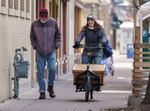
Ben Hodgson, left, walks along as Diana Rempe rides the Street Books library bike in downtown Portland, traveling to another library site in February. Earlier in the pandemic, the library shifted to more one-on-one outreach in an attempt to avoid the type of in-person gathering created by a typical bike library shift, though those have resumed.
Kristyna Wentz-Graff / OPB
The library goes on
Moulton and Hodgson say the end of “Loaners: The Making of a Street Library” was one of the hardest parts to write.
“Because, of course, the library goes on in the most beautiful way,” Moulton said. “Every day offers a fresh, tender ending.”
There will always be more books. After a pause to catch up on inventory, Street Books expects to begin accepting book donations from the public again sometime in April. Maybe there will be more libraries too.
In the back pages of “Loaners,” there’s a how-to guide for readers who want to run street libraries in their own cities. No. 8 on Moulton and Hodgson’s list of advice: “It’s Fun: That’s the purpose, really. Humor and connection.”
Right now, Street Books provides so much in Portland: Books with no strings attached. Requests sought and filled. Personal connection and friendly conversation for patrons who may not have been spoken to once that day. Stories read, and stories shared. Literary mental health support.
“Yeah,” Hodgson said. “Books [are] a great way to keep yourself alive.”
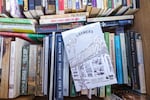
“Loaners,” a book documenting the creation of Street Books. is available to check out of the Street Books library. Ben Hodgson, who was a patron of the library at one time, co-authored the book.
Kristyna Wentz-Graff / OPB
